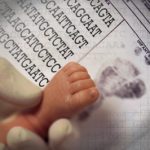 One of the foremost stories of the exponential prowess of the information age has been the rapid fall in the cost of sequencing the human genome. Whilst the first genome to be sequenced cost many billions, you can get one sequenced today for less than $1,000.
One of the foremost stories of the exponential prowess of the information age has been the rapid fall in the cost of sequencing the human genome. Whilst the first genome to be sequenced cost many billions, you can get one sequenced today for less than $1,000.
This rapid fall in price led one study to project that we would have around 2 billion human genomes sequenced by 2025. Whilst much of the initial growth in genomic sequencing has been in adults, a new project aims to increase the screening of newborn babies.
Infant screening
Whilst it’s common for newborns to be screened using a heel stick, it’s much less common for a full genome sequence to be performed. To examine the possible implications of doing this, a new consortium has been formed, called the Newborn Sequencing In Genomic Medicine and Public Health (NSIGHT).
The group hope to work with parents to develop evidence that they hope will help in the development of new guidelines for the screening of newborns.
“Where is the boundary of parental responsibility to learn important health information about their child versus delving too far into genetic information that could take away from that child’s ability to make decisions for themselves?” the team say. “This is one of the main bioethics questions of our time. How much should we protect a child’s capacity to make decisions about what information to learn, or not to learn, about themselves when they become adults? Some people think withholding such information is an old, quaint, paternalistic notion that is being made obsolete by technology. Yet others believe fervently that it could infringe on the child’s autonomy or potentially even harm the child if parents learned or intervened too much.”
It’s believed that genetic screening of newborns could reveal genetic predispositions to things such as heart disease, childhood cancer or even neurodegenerative syndromes.
It raises inevitable questions over what uses that information would be put, and who would have access to it. It’s a range of decisions that the technology is almost forcing upon us as the cost of sequencing has fallen so rapidly in recent years.
Better understanding
The consortium aim to further our understanding of the issues surrounding newborn screenings via a range of studies aiming at three distinct scenarios:
- Diagnostics and the use of genome sequencing to find the specific causes of diseases in babies.
- The use of genome sequencing to help prevent treatable conditions.
- The use of genome sequencing to guide care throughout the child’s life.
The ultimate aim is for the research to support the development of best practice and guide the sequencing of newborns.
“Genome sequencing is a new and still enormously complex process, and oftentimes the results have uncertain implications,” the team say. “Both BabySeq and the larger NSIGHT Network represent some of the first organized approaches to developing the best practices for determining the right information and best ways to return it to parents and their babies’ doctors.”
The technology required to sequence genomes is advancing at a rapid pace, so it’s very easy to foresee a future whereby newborns have such opportunities and are thus empowered with their genetic information from the very start of their lives. The work of NSIGHT will therefore play a crucial role in ensuring such steps are taken wisely.